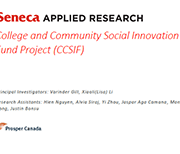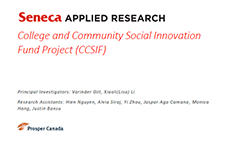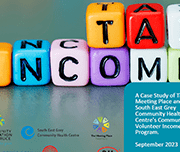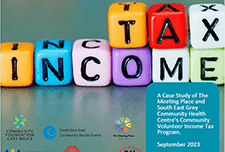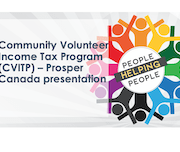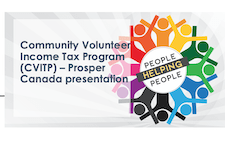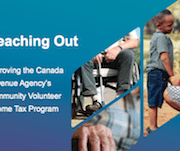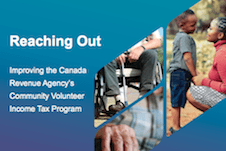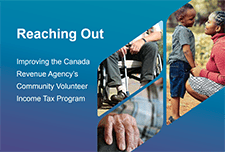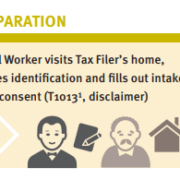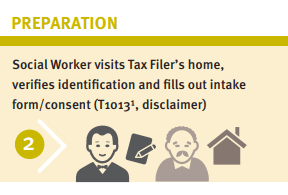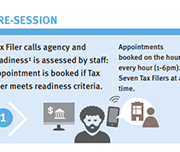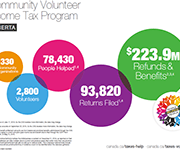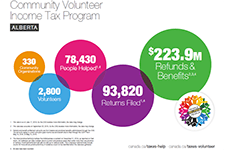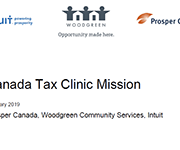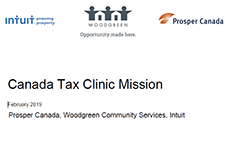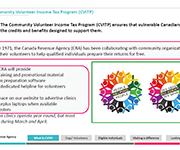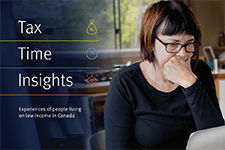Resources
Handouts, slides, and time-stamps
Reaching Out: Improving the Canada Revenue Agency’s Community Volunteer Income Tax Program
The CVITP provides people, who may otherwise have difficulty accessing income tax and benefit return filing services, with an opportunity to meet their filing obligations. Often, filing a return is required to gain access to, or continue to receive, the government credits and benefits designed to support them. This report illustrates that the CRA needs to take a broad, country-wide perspective of the CVITP, while also taking into consideration regional and other differences. Services offered and training provided to volunteers need to reflect the realities of the diverse regional, geographic, socio-economic, workforce, and vulnerable, sectors throughout Canada. Different areas of the country will have different primary needs from the CVITP. The CRA needs to address those needs, both in its actions through the CVITP, as well as in the training provided to CVITP volunteers and the support given to partner organizations.
Reaching Out: Improving the Canada Revenue Agency’s Community Volunteer Income Tax Program
The position of Taxpayers’ Ombudsman (the Ombudsman) was created to support the government priorities of stronger democratic institutions, increased transparency within institutions, and fair treatment. As an independent and impartial officer, the Ombudsman handles complaints about the service of the Canada Revenue Agency (CRA). The Office of the Taxpayers’ Ombudsman hears first-hand the concerns of individuals, tax practitioners, and community support organizations. The Ombudsman visited with Community Volunteer Income Tax Program (CVITP) partner organizations, volunteers, and the Canada Revenue Agency’s (CRA) CVITP coordinators to learn more about the program and to understand the success stories and challenges they all experience. This report gives voice to what they have heard and provides recommendations on how to address the issues raised.
Virtual tax filing: Piloting a new way to file taxes for homebound seniors
WoodGreen Community Services, a large multi-service frontline social service agency in Toronto, provides free tax preparation services year-round to people living on low incomes. WoodGreen was interested in designing a novel solution to address the tax filing needs of homebound seniors who are unable to access WoodGreen’s free in-person tax-preparation services due to physical or mental health challenges. Specifically, WoodGreen wanted to know… How might we provide high-quality professional tax preparation services to all clients whether or not they are onsite? Prosper Canada and a leading commercial tax preparation software company partnered with WoodGreen Community Services in order to answer this design question.
English
Supported self-file process maps: English
French
Community Volunteer Income Tax Program (CVITP) provincial snapshots
This infographics from the Community Volunteer Income Tax Program (CVITP) show information about the program by province for the tax filing year 2019, including number of returns filed and amount of refunds and benefits accessed. The information is presented in English and French. Les informations sont présentées en anglais et en français.
Virtual Tax Filing Pilot
In this presentation, Radya Chaerkaoui, Senior Product Manager and Innovation Catalyst, Intuit Canada, and Steve Vanderherberg, Director-Strategic Initiatives, WoodGreen Community Services, share insights from their Virtual Tax Filing Pilot program. This presentation is from the session 'Innovations in tax filing assistance', at the tax research symposium hosted by Prosper Canada and Intuit, February 7, 2019, in Ottawa.
Get Your Piece of the Money Pie
In this presentation, Althea Arsenault, Manager of Resource Development, NB Economic and Social Inclusion Corporation, shares insights from the 'Get Your Piece of the Money Pie' tax clinic program. This program has operated since 2010, and currently files over 23,000 returns each year. This presentation is from the panel discussion 'National and regional strategies to boost tax filing', at the tax research symposium hosted by Prosper Canada and Intuit, February 7, 2019, in Ottawa.
Get Your Benefits! Diagnose and Treat Poverty
In this presentation, Noralou P. Roos, Co-Director, GetYourBenefits! and Professor, Manitoba Centre for Health Policy, explains how access to tax filing and benefits is an important poverty intervention. This presentation is from the panel discussion 'National and regional strategies to boost tax filing', at the tax research symposium hosted by Prosper Canada and Intuit, February 7, 2019, in Ottawa.
Providing tax filing and benefits assistance to Indigenous communities
In this presentation, Simon Brascoupé, Vice President, Education and Training, AFOA Canada, explains the financial wellness framework and how tax filing presents opportunities for building financial wellness in Indigenous communities. This presentation is from the session 'Closing the tax-filing gap: Challenges and opportunities', at the tax research symposium hosted by Prosper Canada and Intuit, February 7, 2019, in Ottawa.
Supporting Organizations in the CVITP
In this presentation, Aaron Kozak, ESDC and Melissa Valencia, CRA, present findings from their research on the Community Volunteer Income Tax Program (CVITP). This includes recommendations for structural changes to the program, review of CVITP training, changes to registration, and more. This presentation is from the session 'Closing the tax-filing gap: Challenges and opportunities', at the tax research symposium hosted by Prosper Canada and Intuit, February 7, 2019, in Ottawa.
The Community Volunteer Income Tax Program (CVITP)
In this presentation, Nancy McKenna, Manager, CVITP, Canada Revenue Agency, explains how the Community Volunteer Income Tax Program (CVITP) works. This includes eligibility requirements, the size of the program in 2017/2018, and partnerships. This presentation is from the session 'Closing the tax-filing gap: Challenges and opportunities', at the tax research symposium hosted by Prosper Canada and Intuit, February 7, 2019, in Ottawa.
English
Download in English
French
English
2023 Tax Resources: Canada Revenue Agency
The Canada Revenue Agency kicks off the 2023 Tax filing season
- Factsheet – Students
- Factsheet – Persons with disabilities
- Factsheet – Modest income individuals
- Factsheet – Housing insecure individuals
- Factsheet – Adults 65 and older
- Factsheet – Indigenous peoples
- Factsheet: Northern residents deductions
- Factsheet: Individuals experiencing gender based violence
- Factsheet – Newcomers
Resources
- Infographic: Child-related benefits
- Infographic: Newcomers
- Tear sheet: Register for my account
- Tear sheet: Doing your taxes
- Service option card
- Video: Individuals with a modest income
- Video: Persons with disabilities
- Video: International Students
- Video: Students, it pays to do your taxes!
- SimpleFile by Phone automated phone service (formerly called File my Return)
2022 Tax Resources: Canada Revenue Agency
- Benefits and credits fact sheet – Students
- Benefits and credits fact sheet – Persons with disabilities
- Benefits and credits fact sheet – Modest income individuals
- Benefits and credits fact sheet – Housing insecure individuals
- Benefits and credits fact sheet – Adults 65 and older
- Benefits and credits fact sheet – Women in shelters
- Benefits and credits fact sheet – Indigenous peoples
- Benefits and credits fact sheet – Newcomers
Canada Dental Benefit
One-time top-up to the Canada Housing Benefit
Get your taxes done for free at a tax clinic
Canada workers benefit
Make sure you maximize the benefits you are entitled to if you are First Nations, Inuit, or Métis
2021 Tax Resources - Canada Revenue Agency
Last-minute tax tips (Canada Revenue Agency) – April 13, 2021
New Canada Recovery Benefits – What to Expect
Answers to your questions on paying back the Canada Emergency Response Benefit (CERB)
Benefits and credits fact sheet – Indigenous people living in Canada
Benefits and credits fact sheet – Modest income
Benefits and credits fact sheet – Newcomers
Benefits and credits fact sheet – Newcomers in Quebec
Benefits, credits, and deductions for Seniors
COVID-19 Measures for Persons with Disabilities
Benefits and credits – Persons with Disabilities
Canada Workers Benefit – Infographic
Canada Workers Benefit – promotion card
Get your taxes done for free – promotion card
Income tax basics
Why file? The benefits of tax filing (Tax toolkit)
Getting government payments by direct deposit
Income tax 101: What are tax deductions, benefits, credits, exemptions, and brackets? (Tax toolkit)
Considerations for Indigenous people at tax time (Tax toolkit)
Resources about tax filing in Canada (Tax toolkit)
Common tax deductions
Common sources of income and their tax slips
Notice of Assessment – how to read it
Community tax clinic guides
About volunteer tax clinics: Help your community members file their taxes (Tax toolkit)
Getting started as a community tax clinic (Tax toolkit)
Tax clinic staff and volunteer roles (Tax toolkit)
Tax clinic preparation: Recommended timeline (Tax toolkit)
Insights on planning free tax clinics in Indigenous communities: Infographic (Tax toolkit)
Encouraging tax filing at virtual clinics (sample “active choice” email) – The Behavioural Insights Team *NEW*
Tax clinic resources for practitioners
The tax clinic resources below are from our community partner organizations. These are examples that may be adapted to your own community tax clinic needs. Whenever possible, we have credited the original author of each document and included contact information if you would like to find out more about using and adapting the resource.
Resources to support tax clinic delivery and tax filing
Simplified Intake Form 2019 (ACSA, Scarborough, ON)
Tax Clinic Host Checklist (The Working Centre, Kitchener-Waterloo, ON)
Income tax checklist for participants (The Working Centre, Kitchener-Waterloo, ON)
Intake form for Couples (E4C, Edmonton, AB)
Tax Prep Quick Reference Guide (E4C, Edmonton, AB)
Other resources to support participants at tax time
Income tax summary (The Working Centre, Kitchener-Waterloo, ON)
Form for Missing Income Info for Revenue Canada (The Working Centre, Kitchener-Waterloo, ON)
Forms for rental information (The Working Centre, Kitchener-Waterloo, ON)
Referral to FEPS (The Working Centre, Kitchener-Waterloo, ON)
Envelope checklist (E4C, Edmonton, AB)
Seniors Info Sheet – Federal and provincial benefits (E4C, Edmonton, AB)
Resources for outreach and promotion
Tax clinic flyer (ACSA, Scarborough, ON)
2019 tax clinic flyer (Jane Finch Centre, Toronto, ON)
2019 tax clinic flyer (North York Community House, Toronto, ON)
Resources to support tracking and evaluation
Tax data entry sheet – Tax toolkit (Sunrise Community Centre, Calgary, AB)
Anonymous tax tracking sheet (Aspire collective, Calgary, AB)
Additional information and resources on tax filing
Benefits, credits and financial support: CRA and COVID-19 – Canada Revenue Agency (CRA)
Covid-19: Free virtual tax clinics – Canada Revenue Agency (CRA)
Get ready to do your taxes – Canada Revenue Agency (CRA)
Taking care of your tax and benefit affairs can pay off (tax filing info sheet) – Canada Revenue Agency (CRA) *NEW
Slam the scam – Protect yourself against fraud – Canada Revenue Agency (CRA)
Virtual Tax Filing: Piloting a new way to file taxes for homebound seniors – Prosper Canada
Webinar Series on Taxes (May 2020) – Momentum
SimpleFile by Phone automated phone service (formerly called File my Return) – Prosper Canada Learning Hub
Tax season prep – Plan Institute
Demystifying the Disability Tax Credit – Canada Revenue Agency (CRA)
What to do if your tax return is reviewed or audited – OSC
French
Ressources de déclaration de revenus 2024 - Agence du revenu du Canada
Ressources de déclaration de revenus 2023 - Agence du revenu du Canada
L’Agence du revenu du Canada lance la saison des impôts 2023
- Fiche descriptive: Étudiants
- Fiche descriptive: Les personnes handicapées
- Fiche descriptive: Les personnes à revenu modeste
- Fiche descriptive: Les personnes en situation de logement précaire
- Fiche descriptive: Les personnes âgées de 65 ans et plus
- Fiche descriptive: Les personnes autochtones
- Fiche descriptive : Déductions pour les habitants de régions éloignées
- Fiche descriptive : Personnes aux prises avec la violence fondée sur le sexe
- Fiche descriptive: Les nouveaux arrivants
Ressources
- Infographie – Prestations pour enfants
- Infographie – Prestations et crédits pour les nouveaux arrivants
- Feuille détachable : Inscrivez-vous à Mon dossier
- Feuille détachable : Produire votre déclaration de revenus
- Carte d’option de service
- Webinaire – Les personnes à revenu modeste
- Video: Persons with disabilities
- Webinaire – Les étudiants étrangers
- Webinaire – Avis aux étudiants : c’est payant de faire vos impôts!
Ressources de déclaration de revenus 2022 - Agence du revenu du Canada
Fiche descriptive : Étudiants
Fiche descriptive : Les personnes handicapées
Fiche descriptive : Les personnes à revenu modeste
Fiche descriptive : Les personnes en situation de logement précaire
Fiche descriptive : Les personnes âgées de 65 ans et plus
Fiche descriptive : Femmes dans les refuges
Fiche descriptive : Les personnes autochtones
Fiche descriptive : Les nouveaux arrivants
Prestation dentaire canadienne
Supplément unique à l’Allocation canadienne pour le logement
Faites faire vos impôts à un comptoir d’impôts gratuit
Allocation canadienne pour les travailleurs
Assurez-vous de maximiser les prestations auxquelles vous avez droit si vous êtes Autochtone, Inuit ou Métis
Ressources de déclaration de revenus 2021 - Agence du revenu du Canada
Nouvelles prestations canadiennes de la relance économique – À quoi s’attendre
Réponses à vos questions sur le remboursement de la Prestation canadienne d’urgence (PCU)
Recevez vos versements de prestations et de crédits! – Les les autochtones qui habitent au Canada
Prestations et crédits – Revenu modeste
Nouveaux arrivants, vous pourriez recevoir des prestations et des crédits!
Nouveaux arrivants, vous pourriez recevoir des prestations et des crédits! (Quebec)
Il y a des avantages à faire ses impôts! – Personnes agées
Mesures relatives à la COVID-19 à l’intention des personnes handicapées
Des prestations et des crédits pour vous! – Les personnes handicapées
Chaque dollar compte! – L’allocation canadienne pour les travailleurs (ACT)
Chaque dollar compte! Carte promotionnelle pour l’allocation canadienne pour les travailleurs (ACT)
Faites faire vos impôts gratuitement – Carte promotionnelle
Fondements de l’impôt sur le revenu
Pouruoi declarer? Les avantages de produire une declaration de revenus
Recevoir des paiements du gouvernement par dépôt direct
Que sont les déductions, les avantages fiscaux et les crédits d’impôt?
Considérations sur la période d’impôt pour lesautochtones qui habitent au Canada
Ressources pour en savoir plus
Comptoirs d’impôt bénévoles : Aidez les membres de votre communauté
Ressources
S’occuper de ses impôts et de ses prestations peut être payant – Agence du revenu du Canada
Service automatisé Déclarer simplement par téléphone (anciennement Produire ma déclaration)– Agence du revenu du Canada
Démystifier le crédit d’impôt pour personnes handicapées – Agence du revenu du Canada

